Review & Photography by Manny Manson for MPM
Getting into the Utilita Arena that night was a bit of a circus, a slightly confused scramble that had everyone second-guessing which queue to join. Chains got confiscated at the entrance thanks to the heightened security, some fans muttering, some laughing, some resigned, and through it all the staff were absolute legends, moving through the confusion with calm authority, guiding people, explaining where to go, making sure nobody lost anything, keeping spirits high even as the lines crawled forward. By the time Amity Affliction hit the stage, the tension and anticipation in the air had coalesced into something electric, a buzz of ten thousand bodies that felt alive, thrumming in unison, waiting to be released.
The lights dimmed and the band emerged; it was like someone had released a wave of raw emotion. Gympie’s finest, Amity Affliction, had been honing this mix of melodic hardcore and post-hardcore for over twenty years, forming back in 2003 and building a reputation on brutally honest lyrics and music that marries pain with beauty.
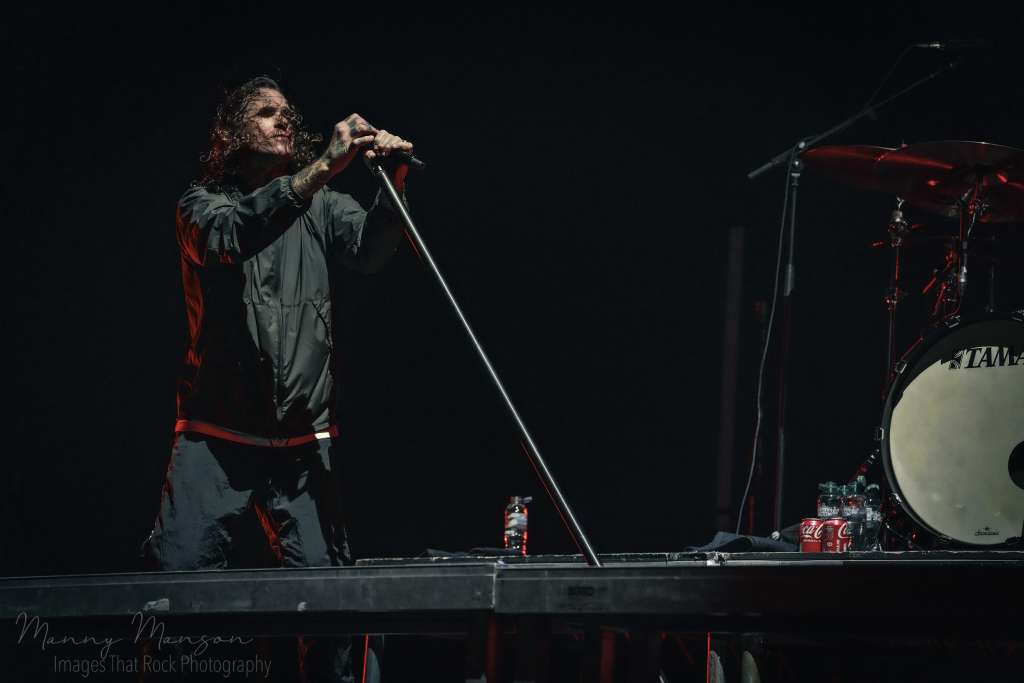
They opened with “Pittsburgh” from Let The Ocean Take Me (2014), raw and jagged, every riff slashing across the arena, every drum hit punching the floor, and Tyler’s vocals slicing through the haze with that desperate edge that’s become their signature. A small pit erupted, I won’t say immediately, but we slowly had a few bodies colliding, hair flying, hands clawing the air as the song wrapped around the crowd like a tangible force.
Without pause, “Like Love” from Somewhere Beyond The Blue (2014) came next, the song’s melodic undercurrents and sudden bursts of aggression hitting in waves.
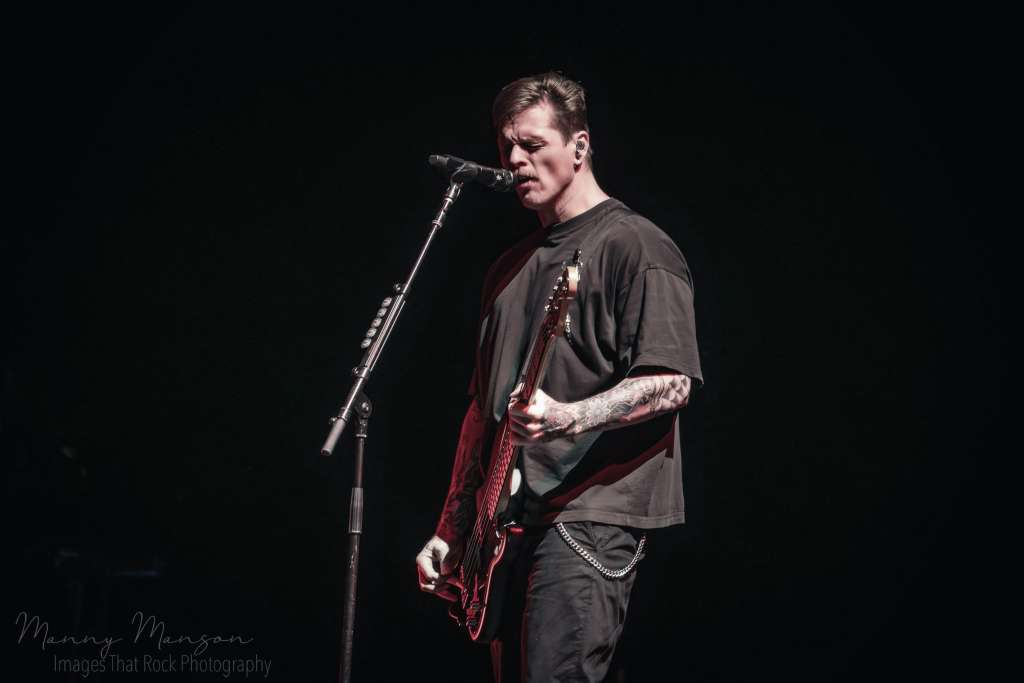
The crowd surged, the hands in the air clapping and waving, some screaming back the lyrics, the lights flickering green and red across the stage, the lack of smoke not giving the full impact of the lighting as the band stood under their large, DOOM like backdrop, the lighting trying hard to echo the song’s tension and release. Each chorus felt like a shared release, the kind that makes a band like Amity Affliction so enduring, they take the weight of their fans’ emotions and bounce it back, tenfold, amplified.
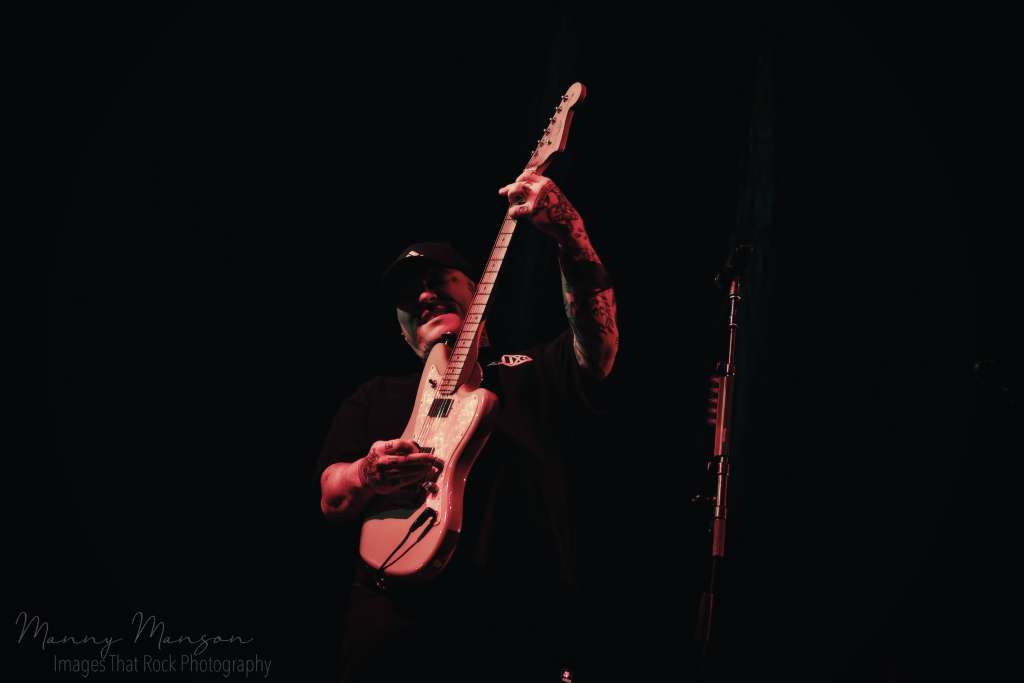
“Drag the Lake” from Misery (2016) tore through after that, every riff jagged, every vocal line guttural, and the floor shivered beneath the chaos of the pit. This album had pushed them toward heavier territory, combining aggression with melodic sophistication, and live it hit like a tidal wave. The crowd moved in unison, surging forward and back with the intensity of the song, bodies colliding, faces flushed, voices screaming along. Then came “All That I Remember,” slower, more reflective, the blue and green lights trying to wrap the arena in melancholy. Some fans bounced, some sang quietly, some just let the emotion wash over them, and in those moments, the music felt as almost as intimate as it did massive.
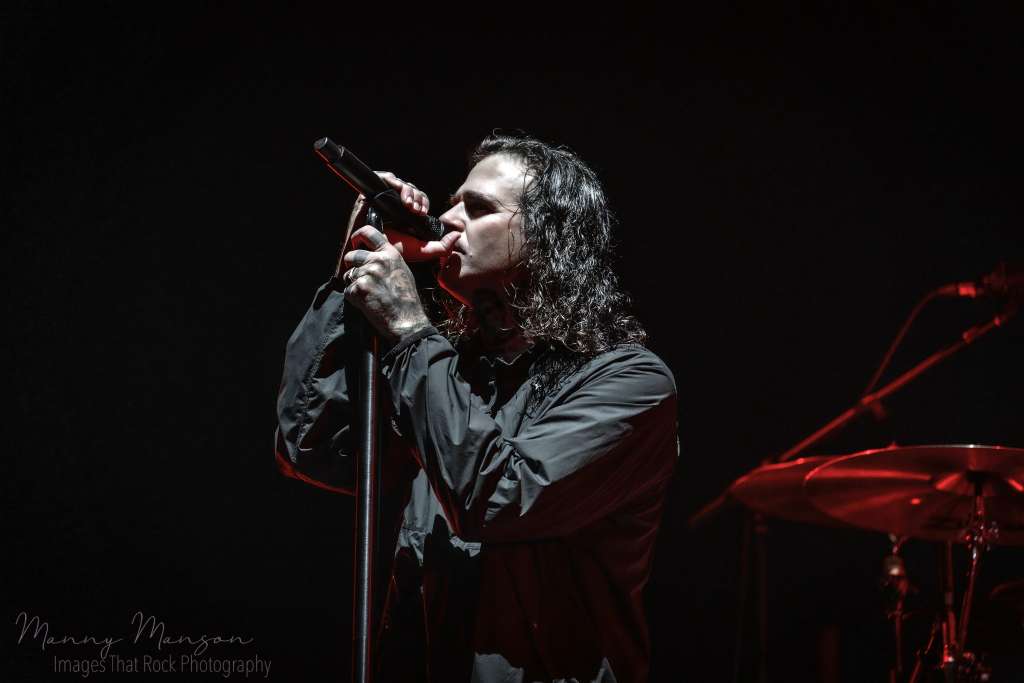
“All My Friends Are Dead” from Everyone Loves You… Once You Leave Them (2020) exploded next, anthemic and furious, the pit thrashing, the crowd singing every word with desperate joy. Orange and red lights cut through the darkness, highlighting faces and fists, and the surge of energy was almost tangible. “Death’s Hand” from Let the Ocean Take Me hit after, heavier, precise, every note landing like a blow, while “I See Dead People” (Not Without My Ghosts) wrapped the arena in a dark, spectral atmosphere. The lights danced across the walls, the audience captivated, drawn into every guitar riff, every drumbeat, every lyric. “It’s Hell Down Here” (Not Without My Ghosts) followed, chorus-fuelled and primal, the pit erupting again, and finally they closed with “Soak Me in Bleach” (Everyone Loves You… Once You Leave Them), twelve minutes of melodic aggression, emotional release, and catharsis. The lights cycled through every colour, smoke curling in waves, the crowd hanging on every note, every lyric. When they left the stage, the energy didn’t fade; it lingered, shimmering, coiling through the arena, feeding into the anticipation for what was next.
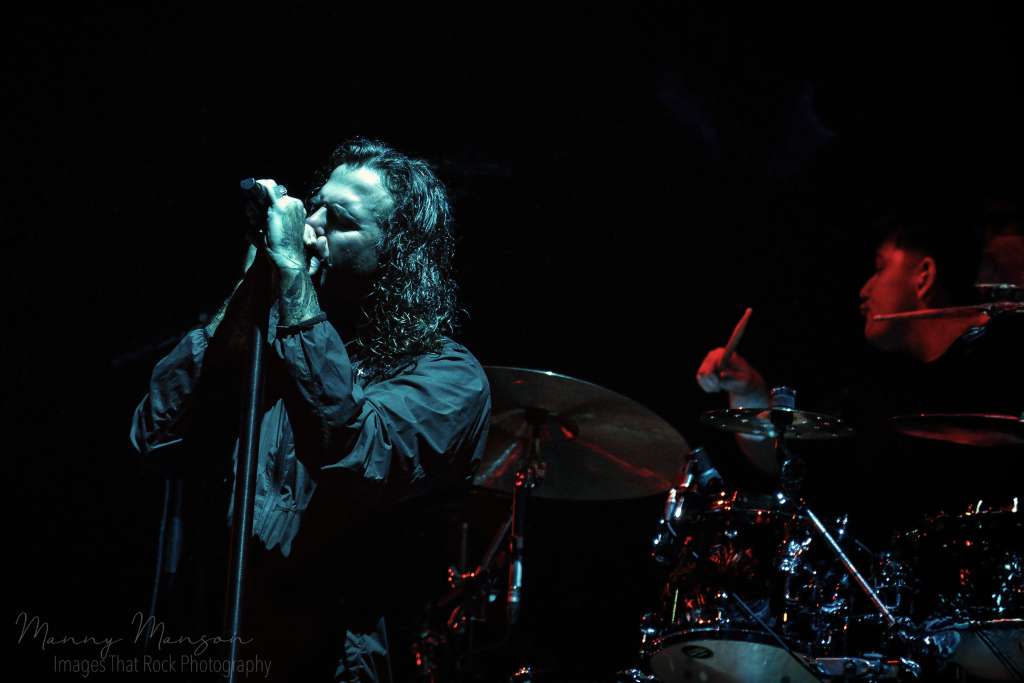
And that anticipation didn’t have long to wait, because as the echoes of Amity Affliction faded, the stage shifted, the lighting changed, and the crowd turned toward the impending wave of brutality that was about to hit. Thy Art Is Murder was next, and you could feel the temperature in the arena rise, the tension crackling in the air, ready to erupt.
The atmosphere lingered low, lights flickering across the crowd in muted reds and blues, and the floor seemed to vibrate with anticipation. After a quick stage reset, Thy Art Is Murder stepped into the haze, a wave of controlled chaos. From Sydney, Australia, formed in 2006, these guys have been shaping the deathcore scene for nearly two decades, building a reputation for sheer technical brutality and thematic weight. Every album has marked a step in their evolution, Hate (2012) laying the groundwork, Holy War (2015) refining their sound, Dear Desolation (2017) deepening their lyrical intensity, Human Target (2019) delivering precision and commentary, and Godlike (2023) pushing into cinematic, atmospheric territory. Tonight, it all came crashing together.
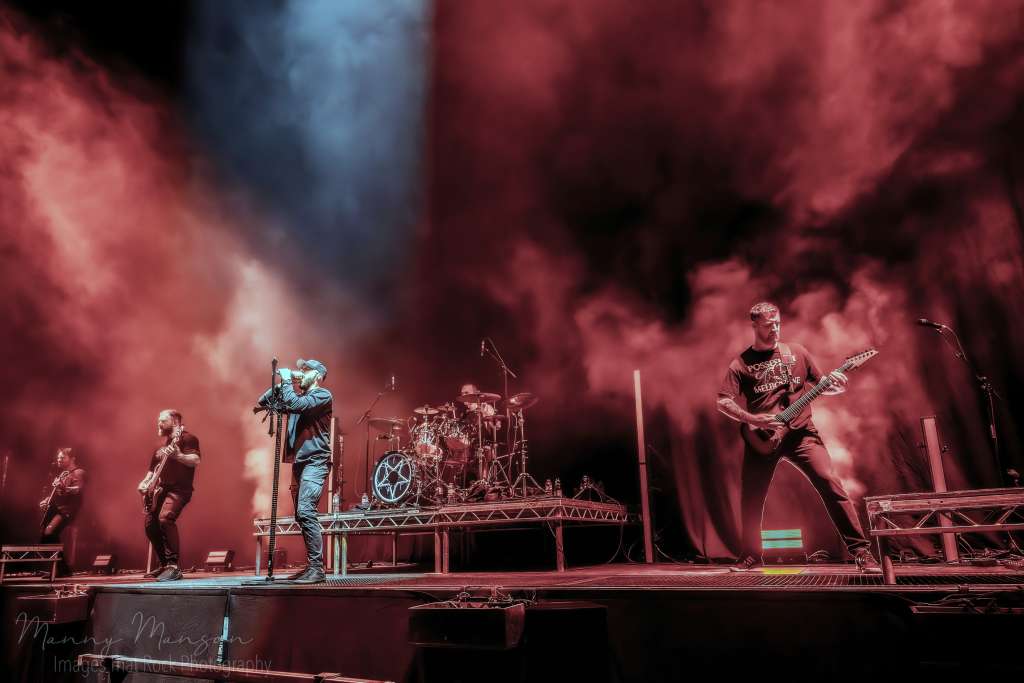
They opened with “Blood Throne” from Godlike, the 2023 album that had already cemented their place at the forefront of modern deathcore. From the first riff, the pit erupted. The bass was a low thrum that seemed to shake the entire arena, the drums snapping and hammering like artillery, and Tyler Miller’s guttural vocals tore through the smoke, commanding attention. The red and orange lights slashed through the haze, catching the band mid-motion, making the smoke swirl as if it had a life of its own. The crowd responded instantly, bodies moving as one, hair flying, fists pumping, every scream of the lyrics reflected back at the band, feeding the energy.
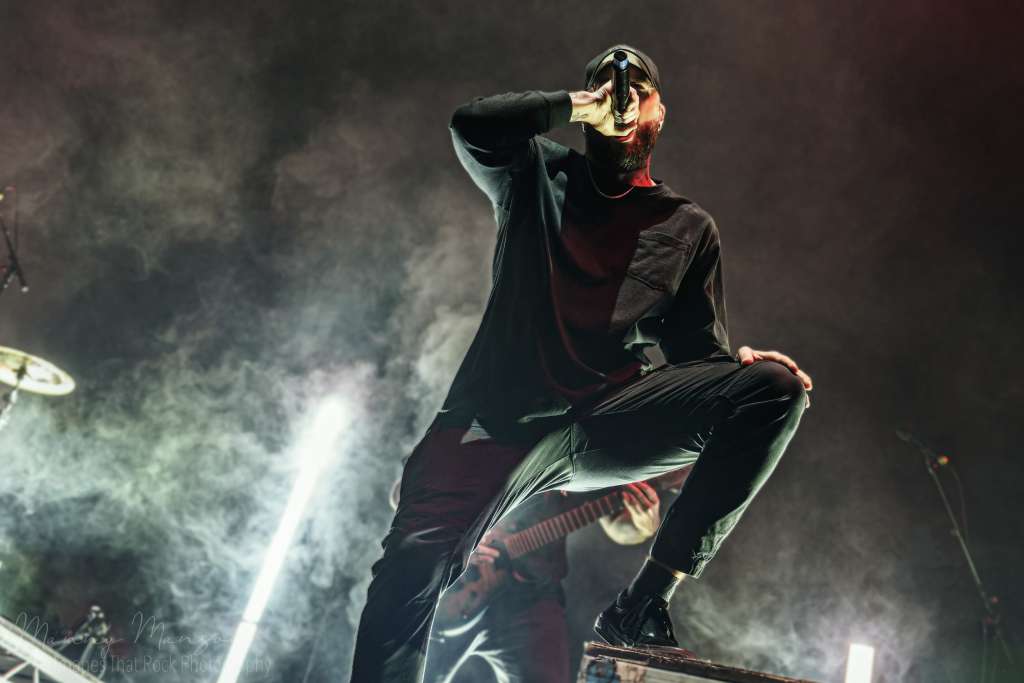
Without pause, “Fur and Claw” from Holy War (2015) cut in, sharper, more jagged, technical yet melodic in its aggression. The green and red lights flickered over the smoke, shadows dancing on the arena walls as the crowd surged and surged again. That album had been a pivot, showing the band could combine brutality with structure, and tonight it landed perfectly, every riff precise, every breakdown hitting like a hammer blow.
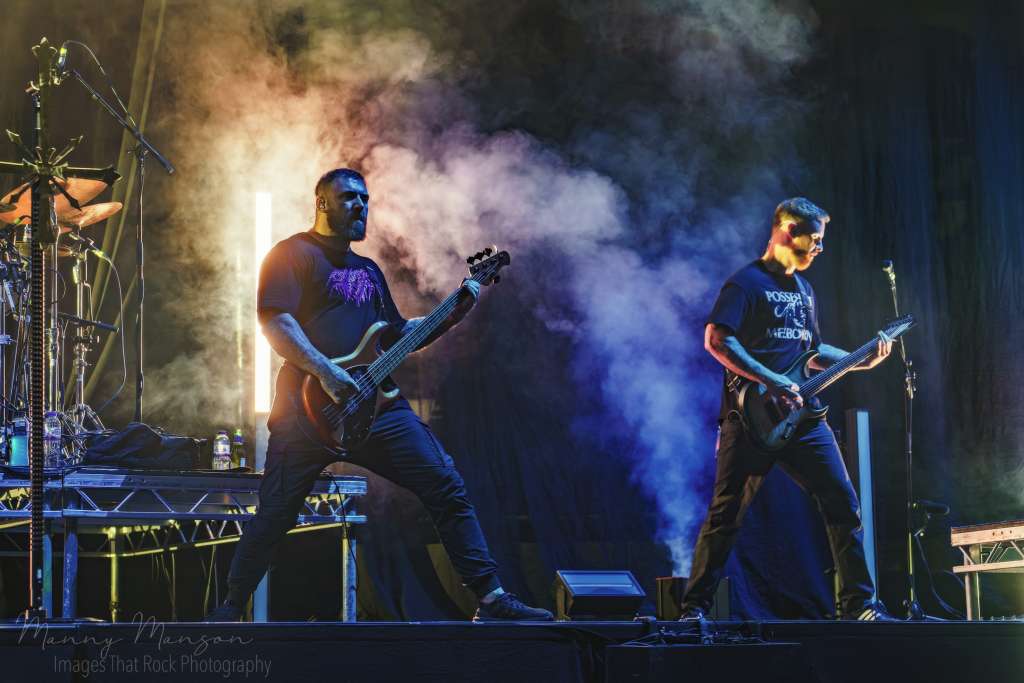
“Death Squad Anthem” from Human Target (2019) followed, the track’s socially pointed lyrics and relentless pace bringing the pit to a frenzy. The blue lighting sliced through the smoke, giving the chaos an almost icy, menacing feel, while the crowd moved like a living entity, feeding the energy back to the band. “Join Me in Armageddon” (Godlike) came next, apocalyptic and crushing, with red and blue lights flashing in jagged bursts, every note a direct hit to the chest. The intensity was relentless, yet precise, the band feeding off the energy, Tyler prowling the stage like a predator, every guttural scream met with thousands of voices screaming back in unison.
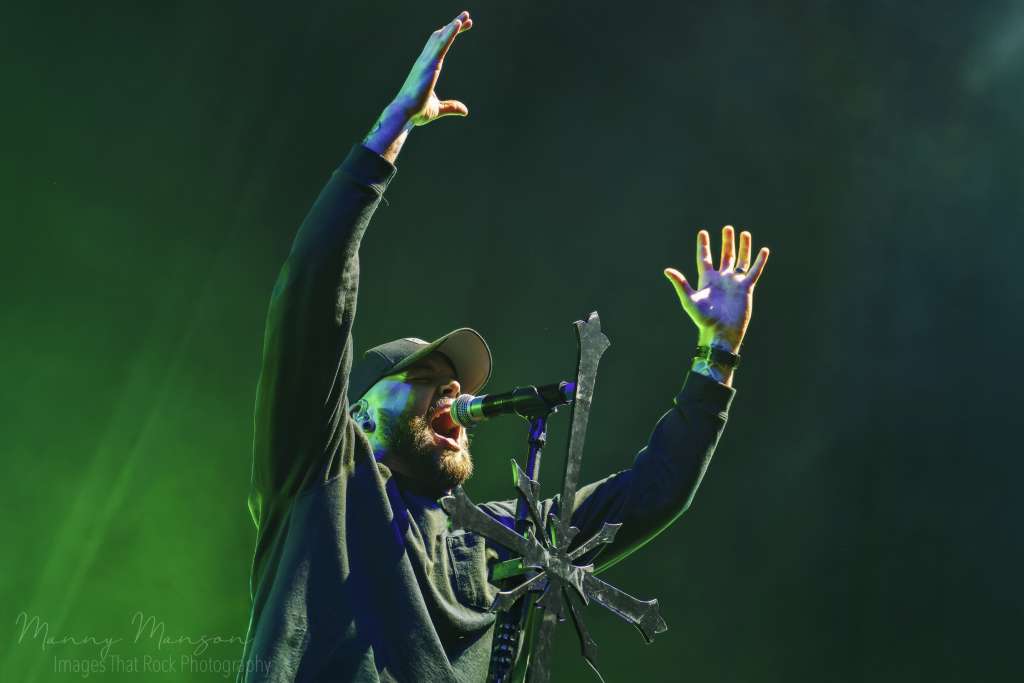
The tempo shifted slightly with “Slaves Beyond Death” from Dear Desolation (2017). The purple and blue lights softened the atmosphere, curling through the smoke as the melodic undertones contrasted with the aggression, giving the arena a brief, haunting respite before the ramp back up with “Holy War” (Holy War, 2015), a track of monumental weight, the chorus a rallying cry, bodies thrashing, fists stabbing the air in sync with the breakdowns.
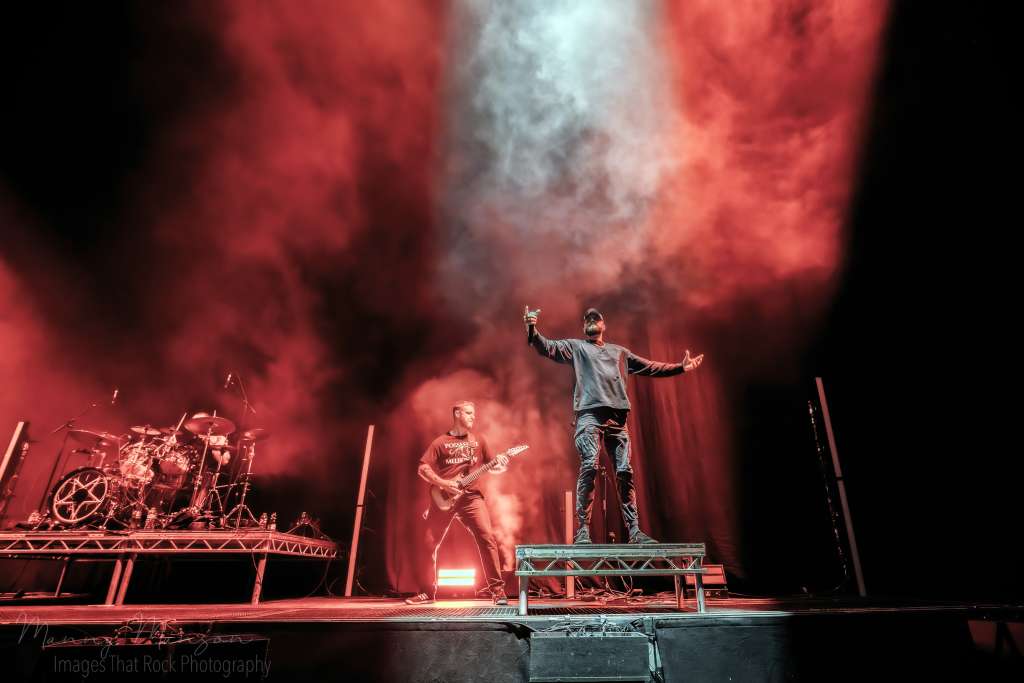
“The Purest Strain of Hate” from Hate (2013) unleashed fury, the red lights bathing the pit in almost bloody intensity. Every riff cut like a knife, every drum beat landed with surgical precision, the crowd screaming every lyric back at them, moshing, spinning, jumping, living every word. “Keres” from Godlike followed, fresh and complex, the green lights slicing through smoke, the track’s intricate rhythms pulling the arena into a collective sway of controlled chaos, a testament to how far the band had come from their Sydney underground days.
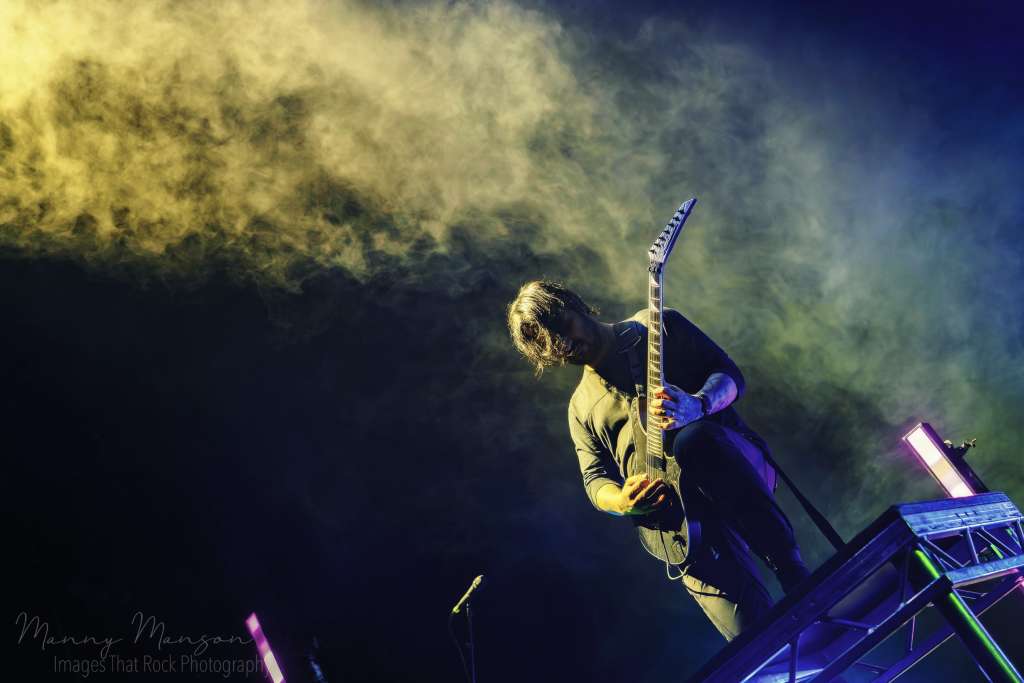
For the encore, “Puppet Master” from Dear Desolation (2017) closed the set, theatrical and dramatic, the lights cycling through every colour in the spectrum, smoke curling, the band moving in perfect synchronicity. Tyler Miller prowled the stage like a conductor of mayhem, every gesture commanding attention, every note landing with immense weight. The pit responded in kind, a living, breathing organism, and by the time the final note hung in the air, the applause was deafening, the roar of the arena a mixture of exhaustion and exhilaration.
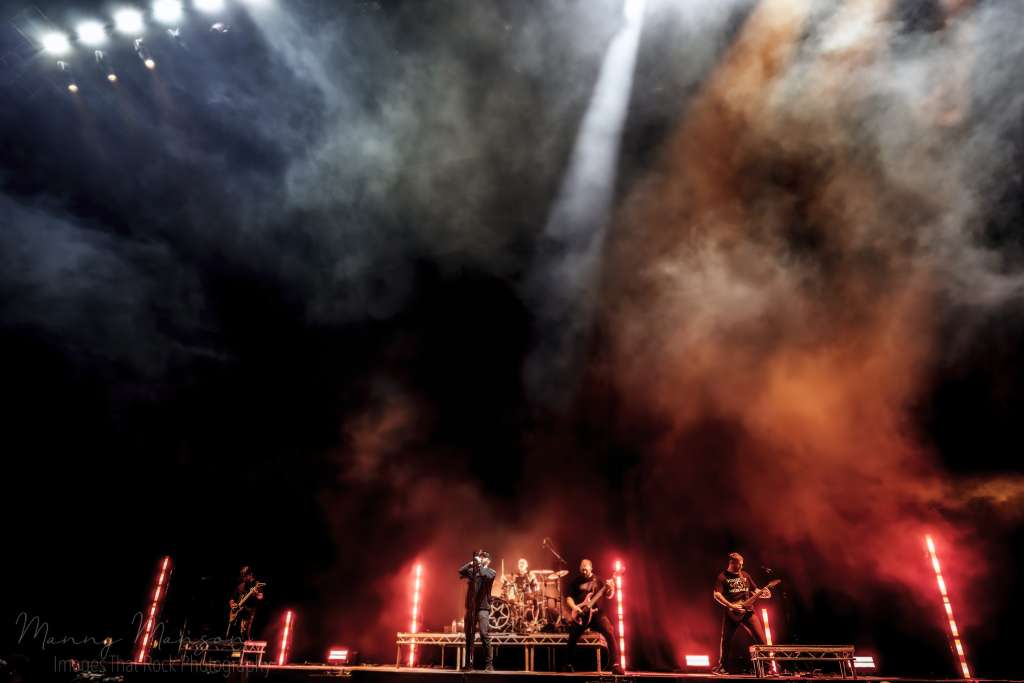
The stage slowly cleared, smoke lingering in thick clouds, and the energy didn’t dissipate — it hummed, coiling through the arena, a tense, electric anticipation. The crowd turned toward the looming shadow at the far end. Parkway Drive were about to step into the blaze, and you could feel the heat shift, the tension crackling, the pit ready to explode into the next chapter of the night.
The buzz hung heavy over Birmingham’s Utilita Arena long before the lights went down, that low pre-show rumble that feels like a physical thing pressing in from all sides, ten thousand people shoulder to shoulder waiting for something violent and beautiful to happen. Bon Jovi was being played over the PA, some fans sang along, others, metal heads looked at the floor trying not to get involved, these were hard core fans. Parkway Drive nights have always carried that energy, that weird mix of menace and community, and tonight it was as thick than ever. When the house lights dropped, red spotlights swept the arena and the place fell into shadow you could almost hear ten thousand lungs hold still, waiting for the break.
And then, AC/D’s Back In Black struck out and it was time, from the back of the crowd rather than the stage, the band appeared, cutting through the mass of people like a living current, climbing over barriers and into the pit, torches of phone lights following them as they made their way toward a small square stage set apart from the main structure. It was a mad way to start, raw and human and close enough to touch, Winston McCall at the front, the rest of them fanning out behind him, that look in his eye that says this isn’t going to be a show so much as a purge.
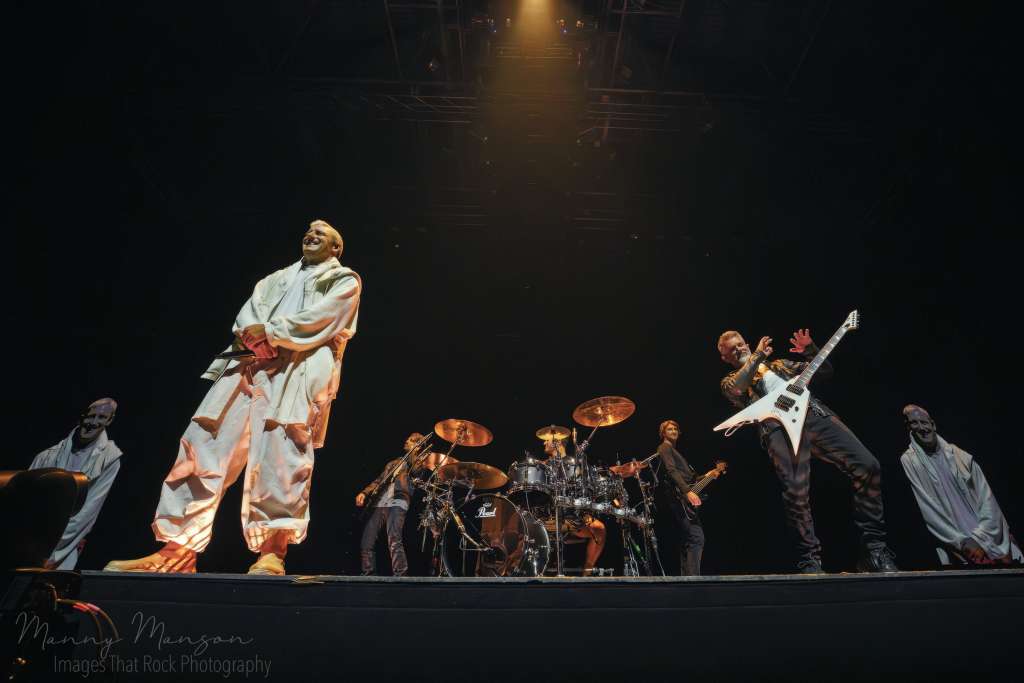
The band ran around the front of the crowd high fiving before ascending to the small island, Winston McCall emerged first, draped in flowing loose white clothing, a hooded oversized coat that billowed like it had been designed for some dystopian, Assassin’s Creed-style epic. His orange boots flashed in the lights, He stood, hands held in front of him his head covered in the hood his eyes closed, the fans spontaneously started the PARKWAY DRIVE chant which brought a wry smile, it continued and he encouraged the fans to give it more, catching every flicker, every reflection, it immediately felt cinematic, not just a concert, but this was going to be a full-on spectacle., making eye contact, grinning, gesturing, Winston and the band where feeding off the human energy.
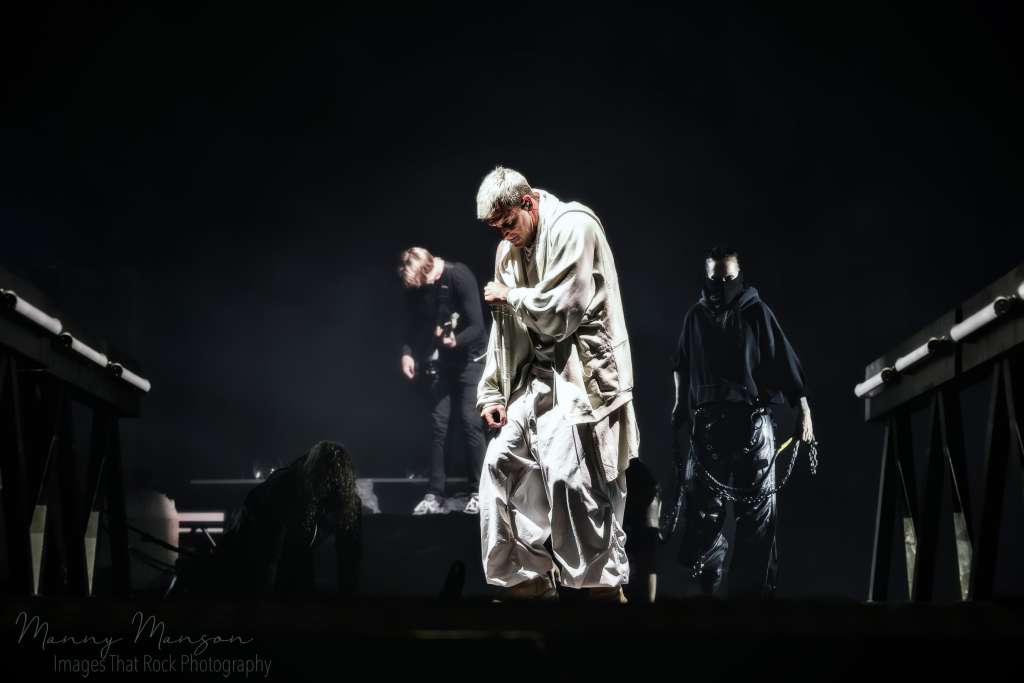
They opened with Carrion, the first track on 2007’s Horizons, the record that put these Byron Bay boys on the global map and still stands like a mission statement. That opening riff hit and it was like the floor cracked open. Winston leaned forward into the storm, veins bulging, eyes wide, spitting every line like a challenge, like he was exorcising everything that had ever dragged him down. Jeff Ling and Luke Kilpatrick flanked him, guitars snarling and locking into that metallic hardcore precision they built their reputation on, while Jia O’Connor’s bass thundered under it, low and dense. You could see people in the cheap seats rising up, fists in the air already. Even after nearly two decades that song still carries the weight of a band fighting to prove itself, and hearing it from that tiny stage in the middle of an arena felt almost symbolic, a reminder of where it all started.
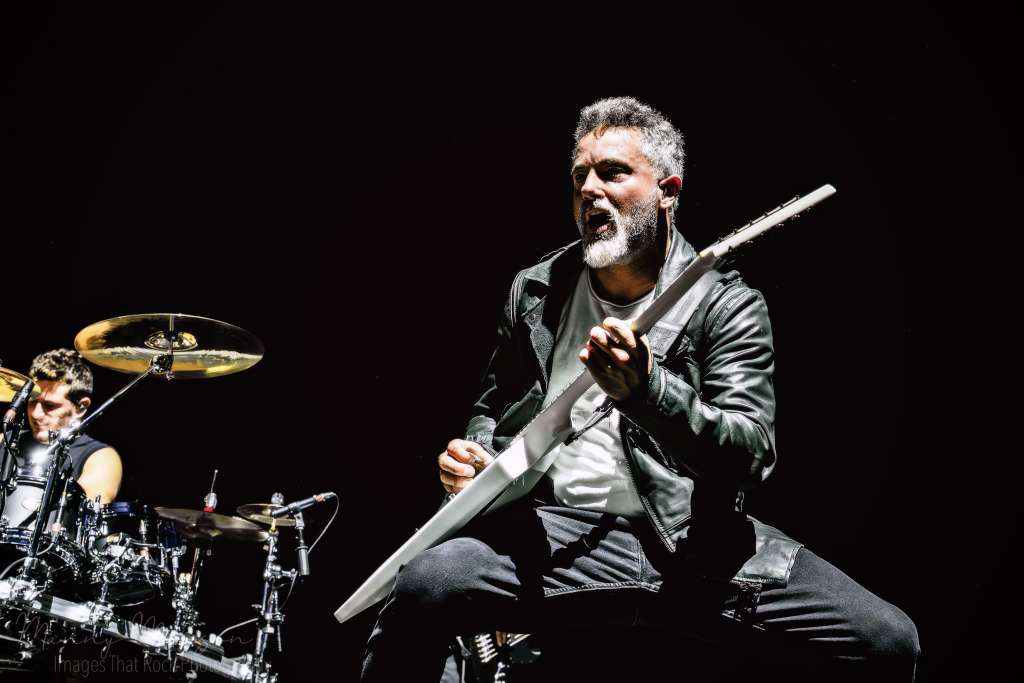
Without a breath they slammed into Prey from 2018’s Reverence, that album where they turned the metalcore formula on its head and aimed for something cinematic. The shift in sound hit instantly, those wide open, galloping rhythms, the chorus built for arenas rather than clubs. Winston stalked the edges of the platform, pointing out into the crowd, urging everyone higher, every shout back echoing off the steel roof. The lighting burst in flashes of white and red, dancers moving in arcs around the stage, and the whole thing felt choreographed but never cold. You could feel the purpose behind every move. Parkway used to be the kids from Byron Bay who surfed and screamed their way through chaos, now they’re ringmasters, still feral underneath but refined enough to control it.
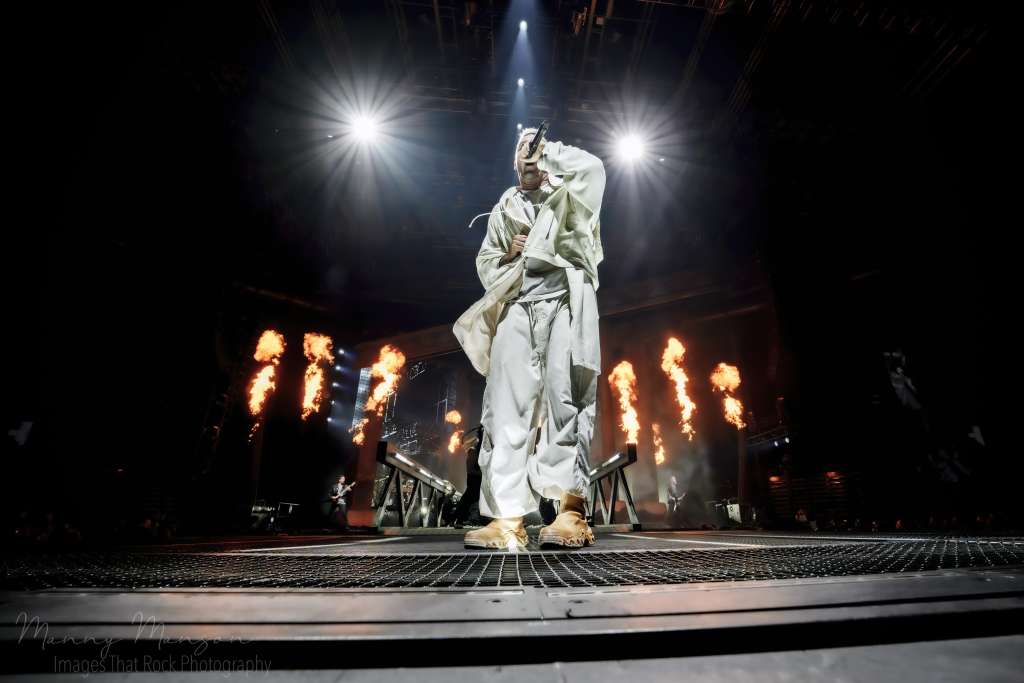
As the last chord rang out, they turned their backs to us, standing still as a mechanical hum filled the space. Then from the ceiling this massive bridge lowered, steel cables glinting, slotting into place between the small stage and the main one. The five of them started walking across, silhouettes in haze, crowd losing its mind below them, and by the time their boots hit the main stage floor the riff for Glitch (off Darker Still, 2022) was already pounding through the subs.
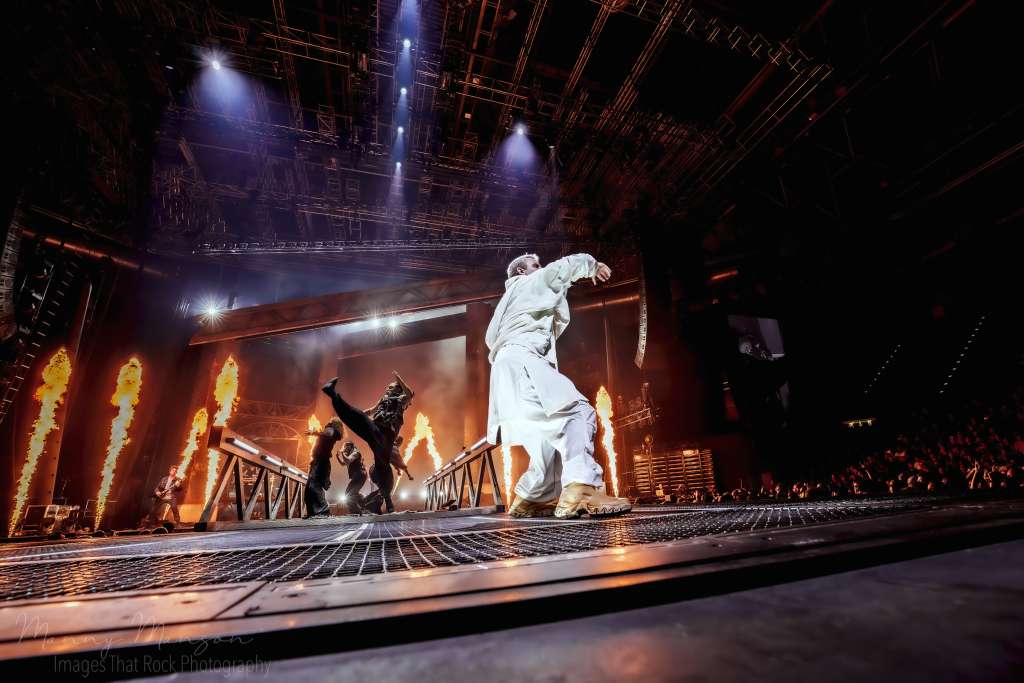
The sound was enormous, the kind of low-end you feel in your ribs, and halfway through Winston suddenly broke off and ran back across the bridge, returning to that smaller square platform. Dancers appeared again, spinning and twisting around him as he belted the lyrics, flames shooting up behind him in perfectly timed bursts. The heat hit from halfway back in the arena, flashes of orange reflected in every sweating face. That’s the thing with Parkway now, they don’t just play songs, they build moments. You could see it in the way Winston moved, half warrior, half preacher, completely locked in.
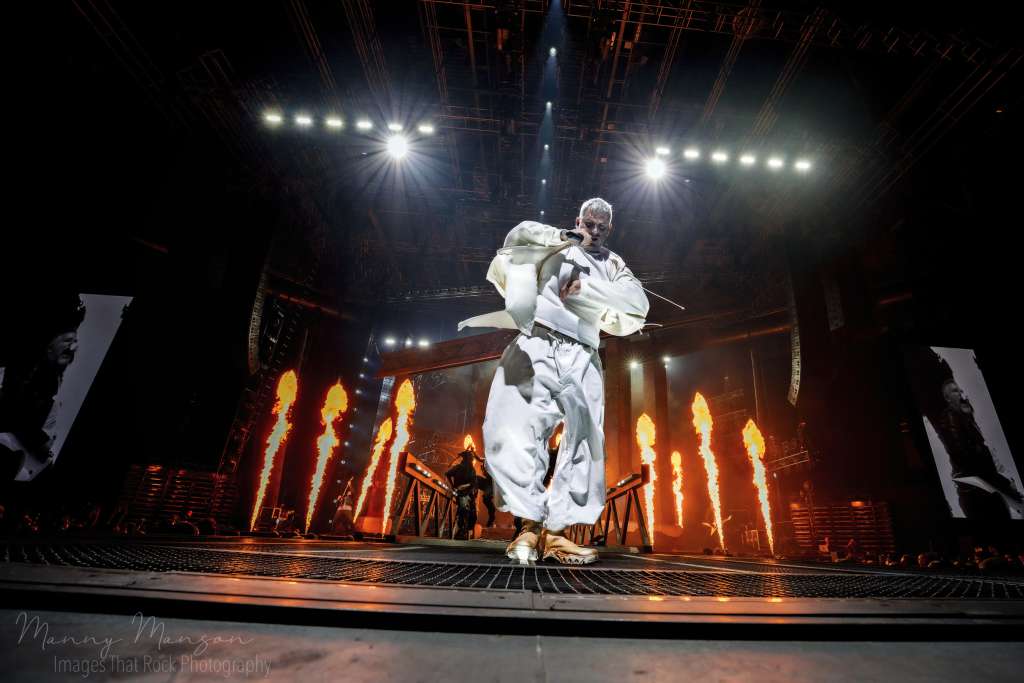
From there it was Sacred, the newer cut from the current touring cycle, carrying that same cinematic weight the band’s leaned into over the last few years. The riffs were lower, slower, the drumming more tribal, and the chorus soared like something written for the apocalypse. Winston held the mic out, the crowd roaring the refrain back at him like scripture. Fire cannons lined the stage edge, bursting up in walls of heat every few bars. You could smell the burnt fuel, feel the dry air rip through your lungs. Parkway used to live by sweat and chaos, but they’ve turned it into theatre now, brutal, immaculate theatre.
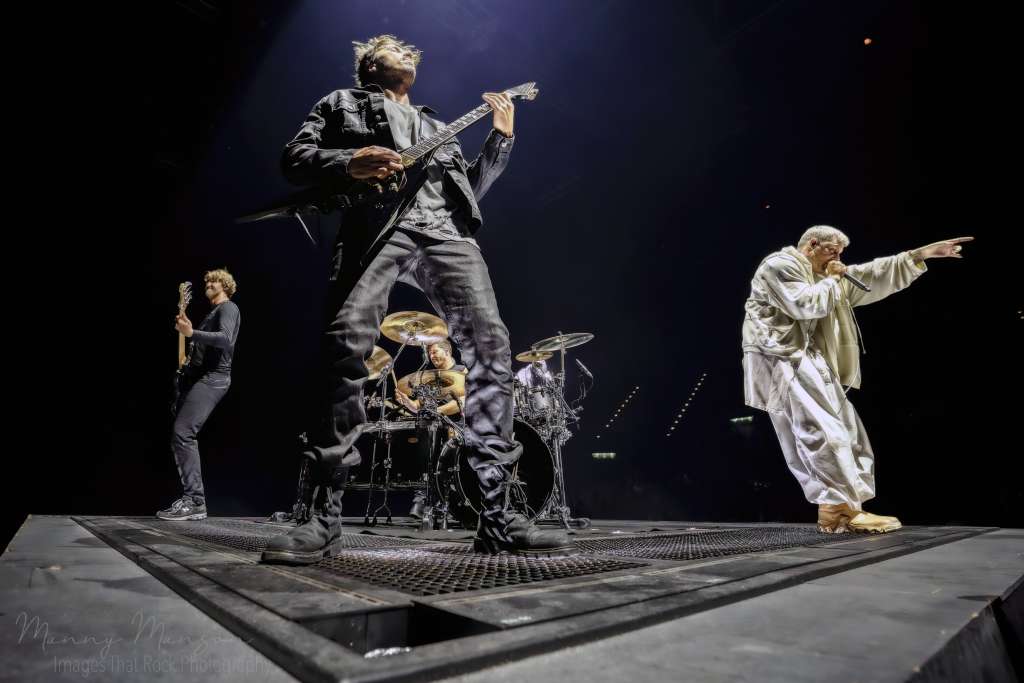
Vice Grip came next from 2015’s Ire, and the shift into that chorus of defiance turned the arena into a riot. That song has always been their crossover moment, the one that dragged the metalcore faithful into stadiums and gave everyone else something they could sing without needing to understand the breakdowns. Winston’s voice was a rasping whip, perfectly imperfect, and when the chorus hit the entire arena sang it like a hymn. Flames lined the catwalk, bursts of sparks falling from the ceiling, all of it timed to those staccato drums. It was ridiculous and it was glorious.
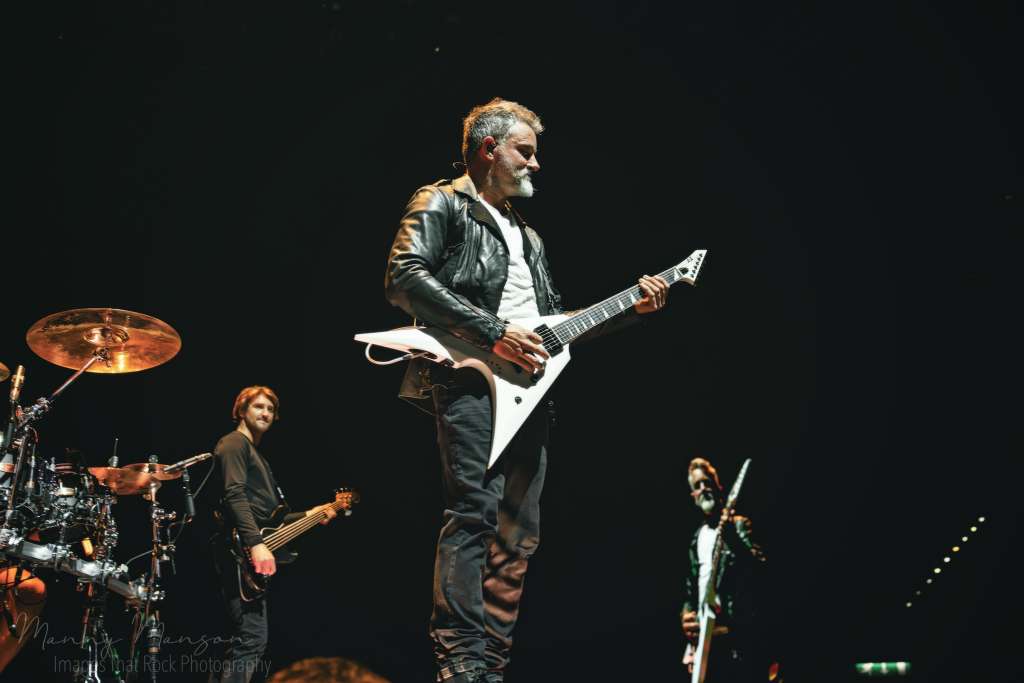
Then Boneyards ripped out, that deep cut from Horizons that still hits like a freight train. And just when the pit was about to cave in on itself, out strode Tyler Miller and Joel Birch from The Amity Affliction to join in. The cheer that went up could’ve taken the roof off. Three voices trading lines, feeding off each other, the chemistry pure fire. Winston laughing between screams, the others pacing the width of the stage like they were born to share it. It was chaos, but the kind of chaos that feels controlled by sheer willpower. You could see Winston mouthing this is family as the last riff hit.
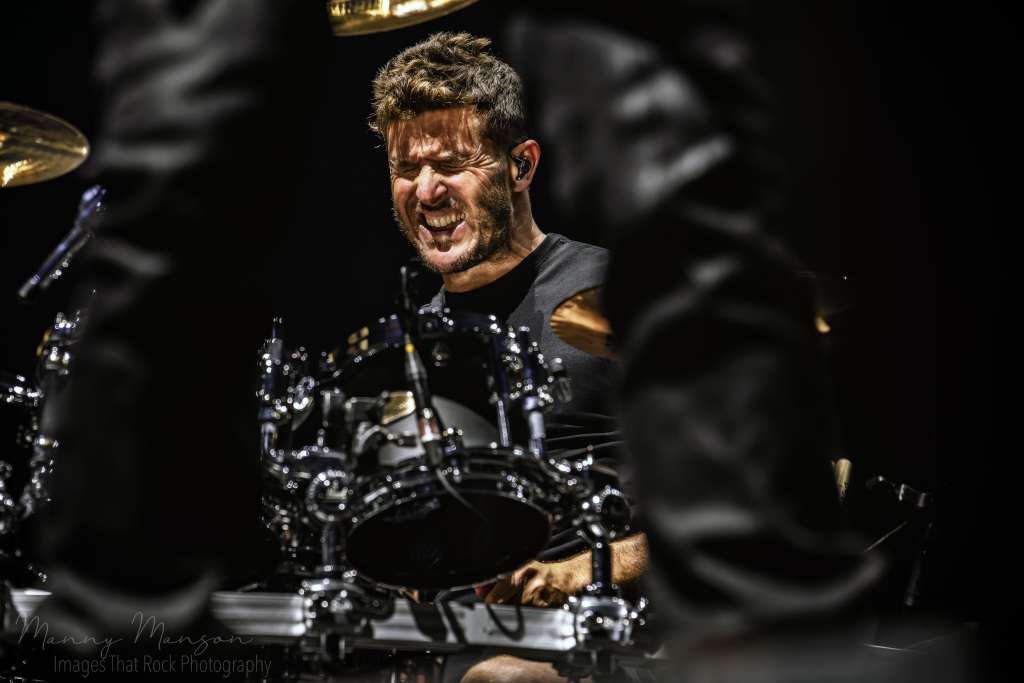
They dropped straight into Horizons itself, that melodic spine that has carried them since their early days. The lights softened for the intro, Jeff Ling’s lead tone cutting through the smoke like a signal flare. The audience was there with him, every syllable known, every note carrying the nostalgia of kids who discovered themselves through this band. When Winston hit the “we are the ocean” line, it felt like the whole arena tilted with him. Parkway have been through hell over the years, personal losses, creative reinvention, even near implosion, and you could feel all that history pulsing through the song.
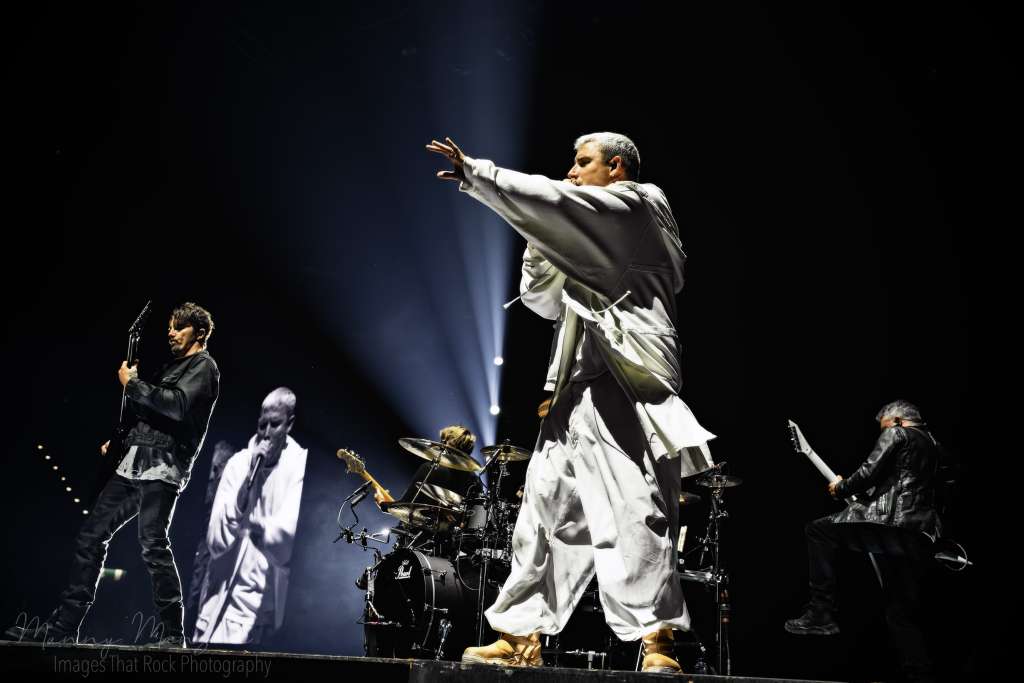
Cemetery Bloom followed, drifting in with that haunting spoken intro that always feels like a calm before a storm. The stage darkened to deep blues, Winston stood dead centre, almost still, voice lower, words more deliberate. When the heaviness dropped back in it hit harder for the restraint that came before. This is Parkway’s new magic trick, the ability to breathe between explosions. The fire jets snapped back to life, throwing light on Winston’s face, his eyes half closed, mouth open wide. The crowd wasn’t just reacting anymore, they were part of it, caught in the same current.
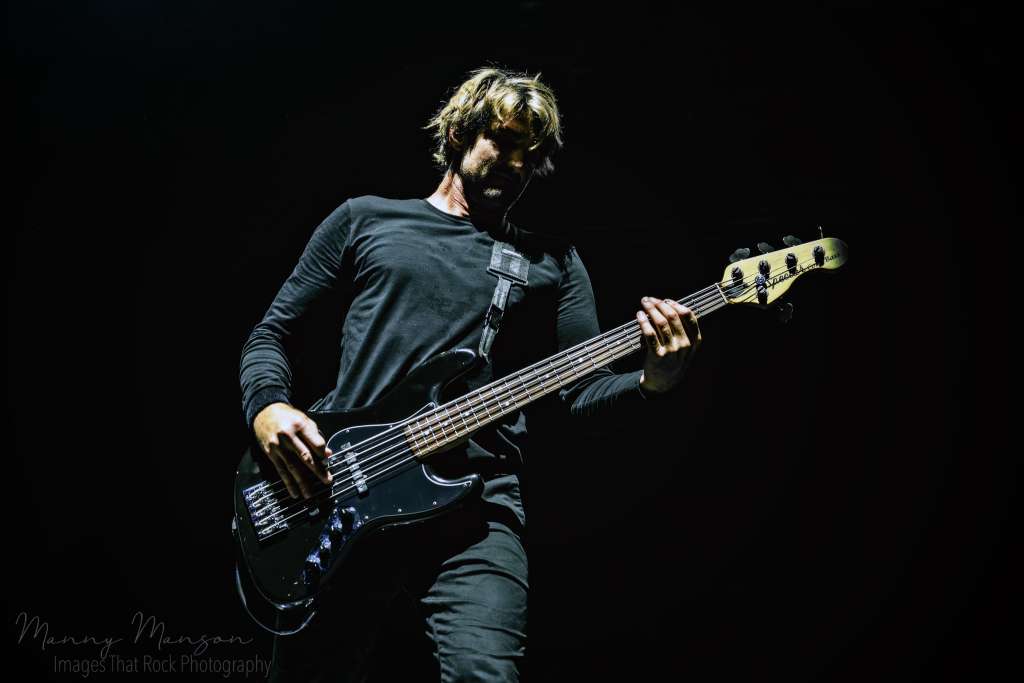
The Void came down like a hammer. That song has become one of their modern classics, the kind of anthem that sits perfectly between brutality and beauty. The dancers returned, the lighting turned to sharp vertical beams, and every chorus felt like a detonation. Winston was pacing again, whipping the mic lead around, hair plastered to his face, sweat flicking off with every movement. This was the point where you realise just how far they’ve come from the sweaty Byron Bay sheds of the early 2000s. They’ve built an empire on discipline and fire.
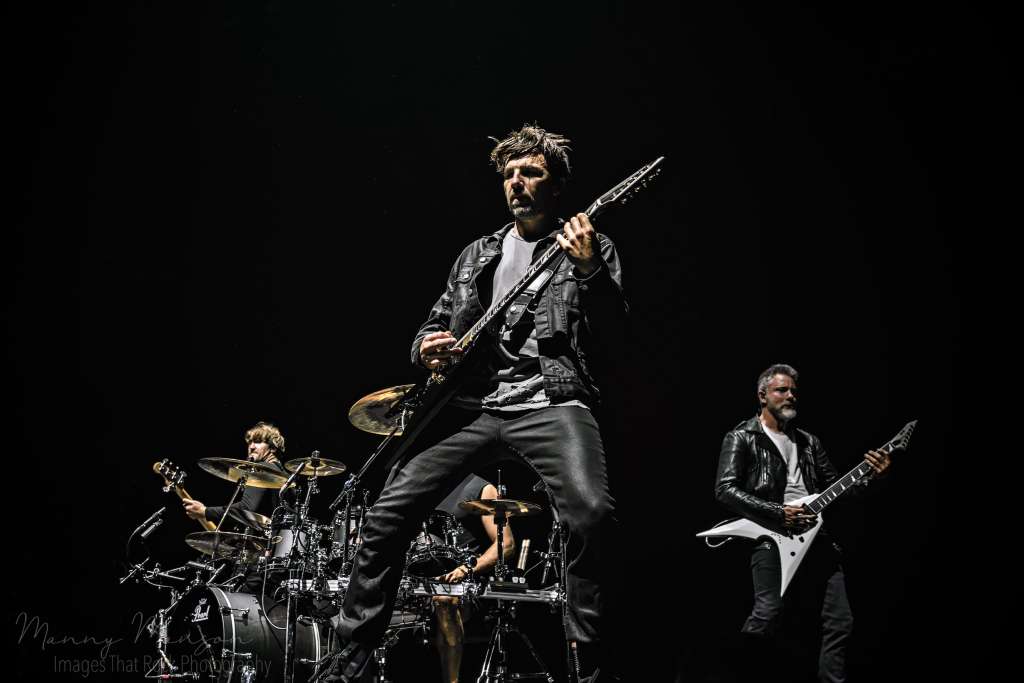
From there into Wishing Wells, and the energy turned inward again. That slow, deliberate opening, Winston crouched low, voice cracked but controlled, then the eruption into full force. You could feel the emotional weight of that song, the loss and the anger that fed into Reverence. Every time he screamed “Until I’m broken” it felt like the words were being ripped out of him. The production around it was massive, layered lights, smoke columns, but somehow intimate all the same. It’s a strange trick they pull off, being both immense and human.
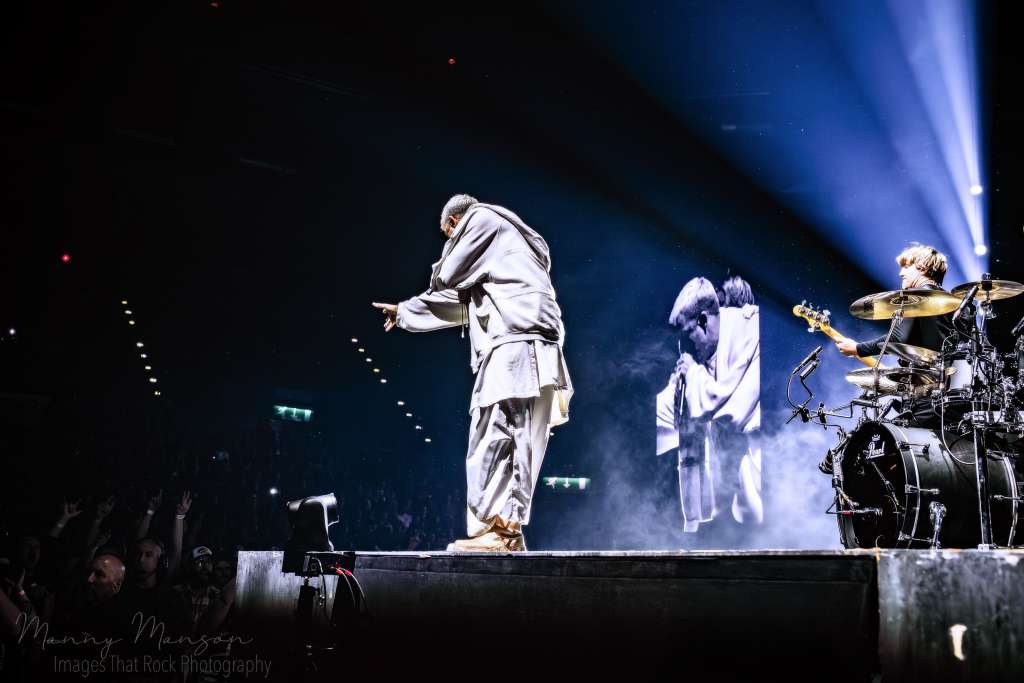
Then came something wild, a Killing With a Smile medley, a callback to 2005, when they were still that hungry DIY band tearing up tiny clubs across Australia. The riff from Gimme A D hit and the old-school fans lost their minds. They blasted through chunks of Anasasis, Mutiny, It’s Hard to Speak Without a Tongue, Smoke ’Em If Ya Got ’Em, and Romance Is Dead, each one landing like a jab to the chest. No polish here, just raw fury. Winston’s voice cracked and bled in the best way, his smile half-mad, the band tighter than ever. It was a love letter to the old days, to sweat-soaked floors and cheap amps, and it grounded the entire night beautifully.
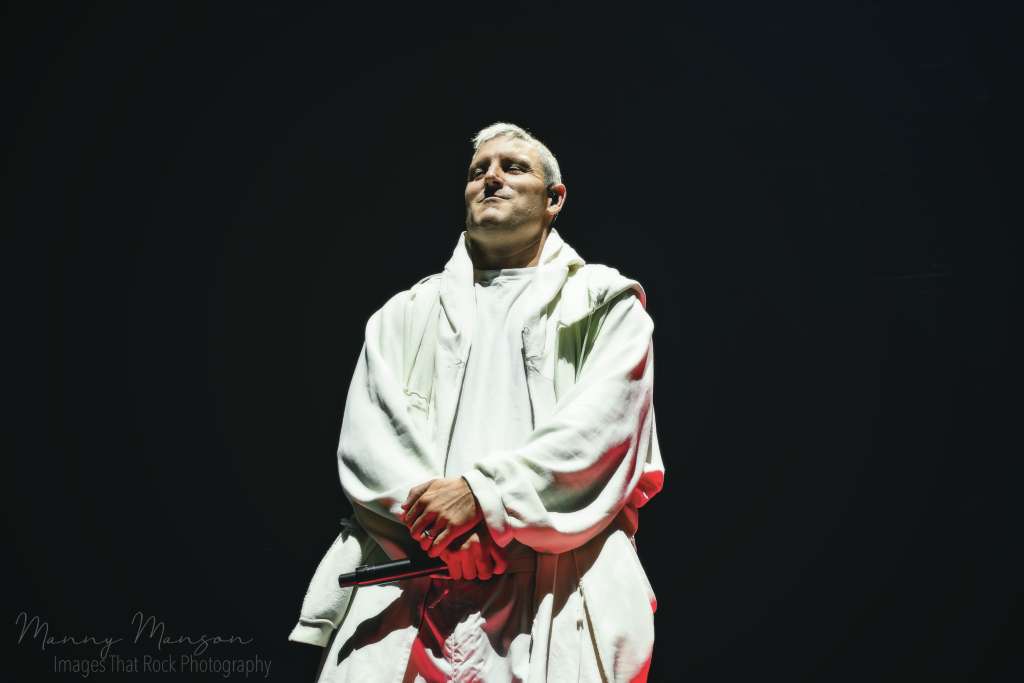
Dark Days from Atlas 2012 rose out of that chaos with its mournful melody and grim prophecy vibe, Winston leaning into every word. That album marked the start of their climb into wider recognition, and this song has aged into something powerful, heavier, slower, almost elegiac. The flames pulsed in rhythm; the band framed in a wash of orange and smoke. When the chorus hit, that line “The dark days are here” felt more like acceptance than warning.
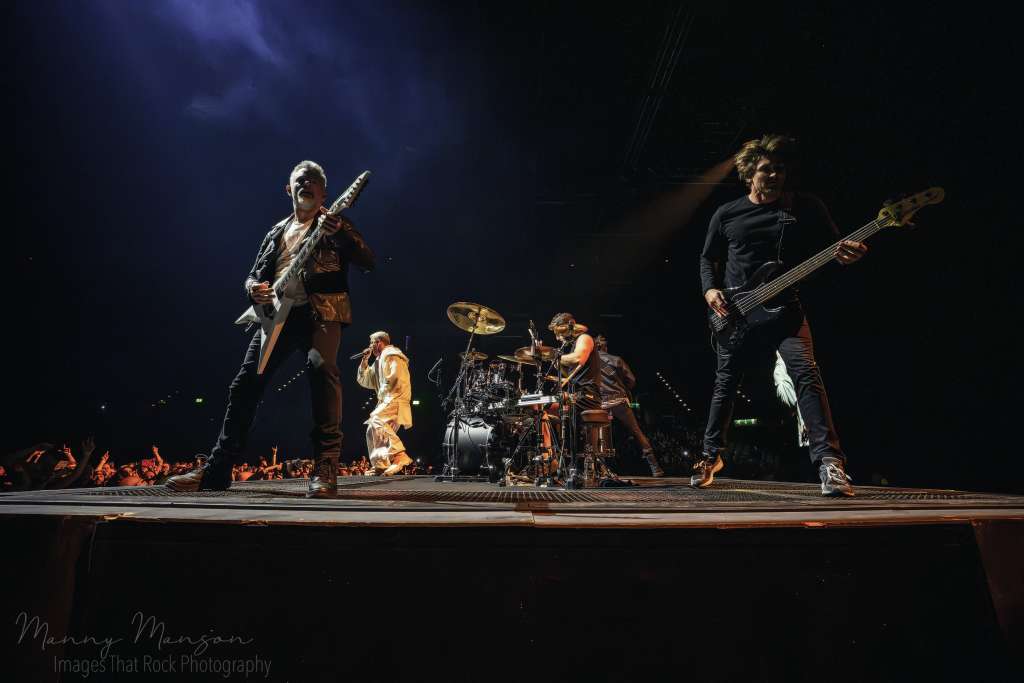
Then Idols and Anchors, that beautiful monster from Horizons, and this was the moment Winston left the stage entirely and walked straight into the crowd. You could see the security trying to clear space but he waved them off, moving through the mass of bodies, still singing, people screaming the lyrics inches from his face. He climbed up onto a barrier and just stood there, drenched, screaming the final lines as the pit surged beneath him. It was chaos and communion all at once, the kind of thing you can’t fake. He stayed there long enough to make it feel dangerous, then disappeared back toward the stage through a sea of hands.
They rolled straight into Chronos from Reverence, that rolling mid-tempo burn of a track. The visuals went cold, deep blues and silvers, giving everything a submerged feel. Winston’s delivery was sharper now, almost percussive, the rhythm section pounding behind him like artillery. The flames came back in flickers, timed with the tom hits, and the whole song pulsed like a heartbeat. Parkway have always known how to work dynamics, and this was proof, one minute you’re being crushed, the next you’re floating.
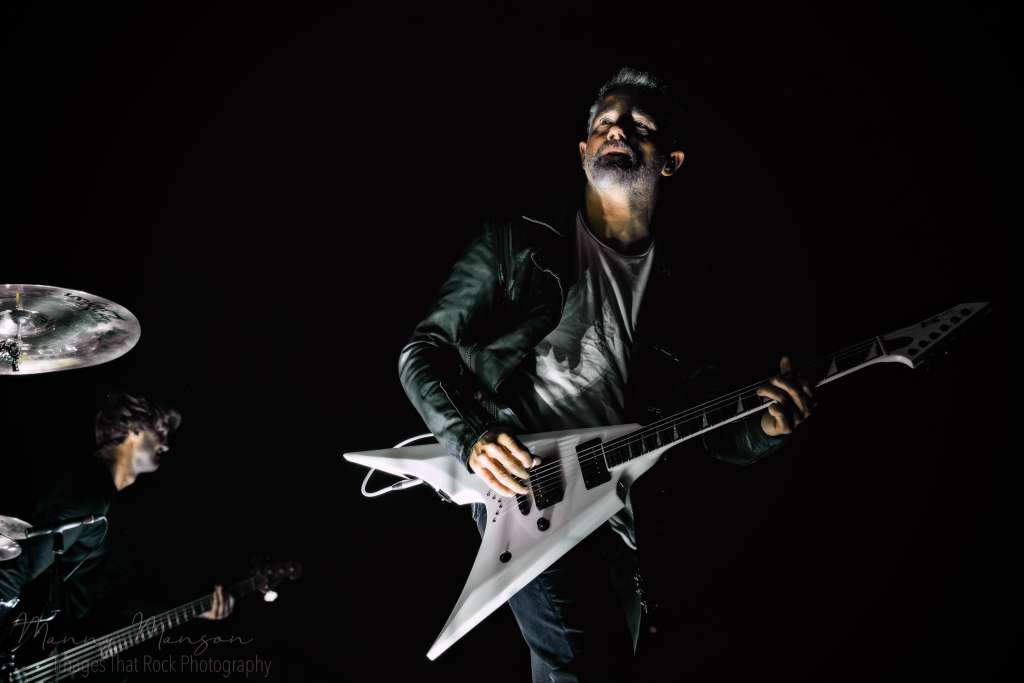
Then Darker Still, title track from their 2022 record, and everything slowed again. The lights dimmed to almost nothing, Winston’s voice more spoken than screamed at first, then the guitars crept in, melancholy and clean. When it broke into the chorus the stage lit up in gold, smoke swirling, fire bursting behind them. It’s one of those songs that shows how they’ve evolved, more melody, more structure, but still that emotional core that made them dangerous in the first place. You could see people in the crowd mouthing every word, some with eyes closed, just swaying. For a band that started out breaking bones in tiny rooms, this is the kind of evolution that feels earned.
Then Bottom Feeder exploded like a riot siren, back to Ire again, the low-end shaking the entire floor. Winston was everywhere, up on the risers, back down to the monitors, screaming like his throat was made of wire. The lights strobed so fast you could barely see the movement. The pit opened right up, this wild ocean of limbs and adrenaline. The band were on another level now, locked in, no wasted motion. When it ended, the silence was deafening for half a second, everyone catching breath before the roar of demand brought them back out.
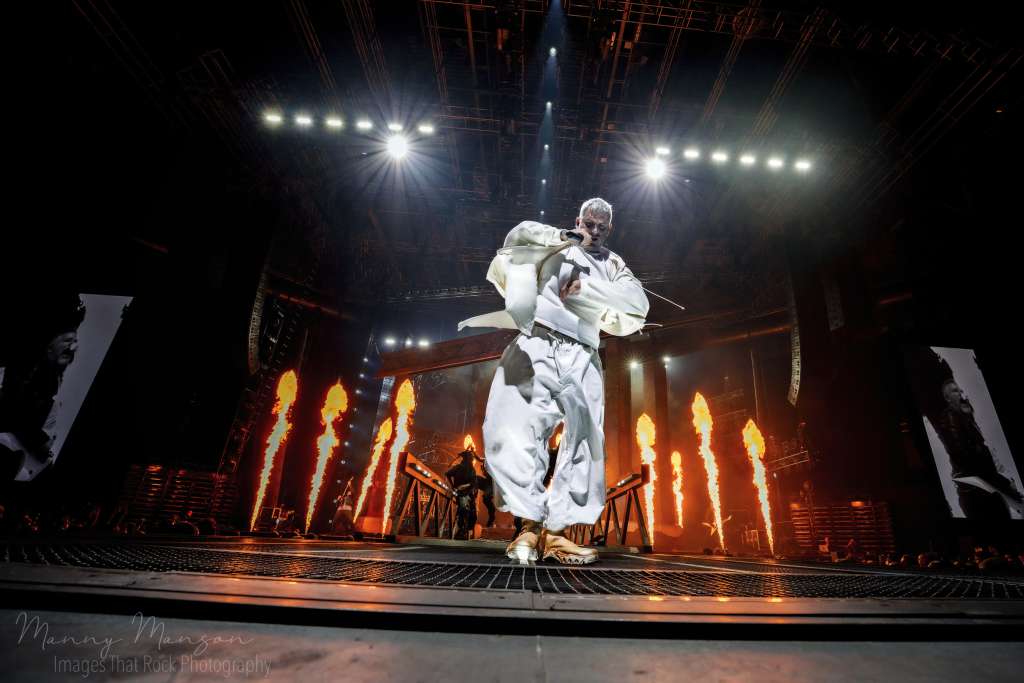
The encore was a one-two knockout. Crushed hit first, with Ben Gordon stepping out front for a few seconds of drum madness before the full riff detonated. The flame jets ran down the length of the stage, the crowd chanting “Crushed by the fist of God!” so loud it drowned the PA. Winston was half laughing, half screaming, pointing from one side of the arena to the other. It was total domination, a masterclass in how to finish a set without mercy.
And then the lights fell to deep white and the first notes of Wild Eyes drifted in, that unmistakable chant rising before the riff even hit. The band stood shoulder to shoulder, faces lit from below, the crowd already singing the lead line.
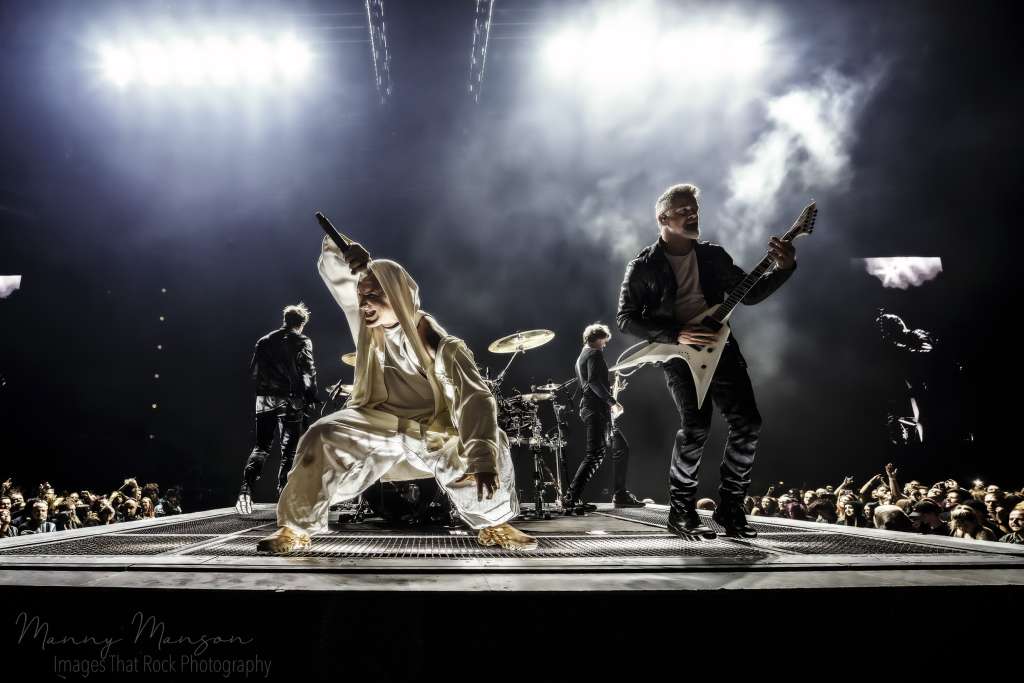
This has always been their rallying song, the one that binds everything they’ve done. No dancers now, no extra flames, just the band and ten thousand people screaming it together. The final chorus stretched out forever, the sound huge and human and perfect. When it ended Winston dropped to his knees, breathing hard, grinning like he’d just survived something holy. The band gathered behind him, arms over shoulders, taking it all in. The fire died down, the lights softened, and for a few moments you could feel the aftershock hanging there, that shared exhaustion, that beautiful wreckage that only happens when a band gives everything.
Two decades since they crawled out of Byron Bay’s hardcore scene, Parkway Drive are still a band built on belief, belief in themselves, in their fans, in the idea that you can turn pain into spectacle and rage into connection. Tonight was proof of that. Every song stitched another layer onto their history, every flame another reminder of how far they’ve come. From the sweaty chaos of Killing With a Smile to the grandeur of Darker Still, it’s been a wild climb, but here in Birmingham, with ten thousand throats roaring back at them and the air still hot with fire, you could feel that they’ve never lost the hunger. They’ve just learned how to control it. And when Winston finally dropped the mic and walked back across that bridge, disappearing into the smoke, you knew the story wasn’t done, just burning, still burning, somewhere beyond the dark.







